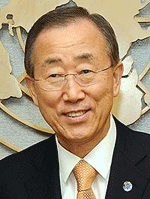Calls grow to broaden search for next U.N. Leader
Published on Thu, 2014-11-06 09:41
There is no job description for the world’s top civil servant, except to solve its messiest problems. There are no campaign rules, nor is there any list of qualifications, except what is left unsaid: He (and it has always been a he) must be palatable to the world powers. Now, as jockeying begins for the selection of the next secretary general of the United Nations, to be chosen in 2016, momentum is building to open up the process. A coalition of nongovernmental organizations, supported by some former United Nations diplomats, is calling for a formal application process, including transparent selection criteria, an official shortlist of contenders and a chance for all member nations to evaluate the candidates. The effort reflects a growing frustration with the dominance of the five permanent members of the United Nations Security Council, which bargain for influence over every important office within the system, most importantly the post of secretary general. The choice is made largely in secret, in council meetings held privately and in tough negotiations among officials from the five powers. The secretary general of the United Nations, Ban Ki-moon, at a refugee camp in Kenya in October. He will step down in 2016. CreditThomas Mukoya/Reuters The coalition of nongovernmental organizations, which calls itself1for7billion.org, described the process as “significantly outdated.” “It falls far short of modern recruitment practices for high-level international appointments, as well as of the U.N.’s own standards and ideals,” the group wrote in a letter that it plans to send on Wednesday to the heads of all 193 members. The group, which has started a website, added in its letter, “A more open and inclusive selection process engaging all U.N. Member States will also help to revitalize the U.N. and enhance its global authority.” Its chance of success is unclear. The Security Council is led by its permanent members — Britain, China, France, Russia and the United States, all of which enjoy veto power — and efforts to expand the permanent roster have been stalled for years. Previous calls to open the selection process have failed. The new campaign is hoping to gain traction by raising a fuss on social media. It comes as the United Nations is trying to tackle a raft of new crises that transcend national borders, including climate change, Islamist extremism,Ebola and a surge of refugees. “This has been for a very long time a concentrated decision-making process,” said Juan Carlos Mendoza García, the ambassador of Costa Rica, which has long agitated on this issue. “We think it’s time to open it up.” The current secretary general, Ban Ki-moon, finishes his second term at the end of 2016. His successor is to start in 2017. Exactly when the appointment will be announced is also unclear. There is no set timeline, which leads to intense last-minute power struggles. David M. Malone, a Canadian diplomat who has written books about the Security Council and now serves as rector of the United Nations University in Tokyo, said the selection process created frustration among emerging powers that want to sit at the top table of world power. Continue reading the main storyContinue reading the main story “While several secretaries general have turned out to be accomplished,” said Mr. Malone, who is not part of the campaign, “the risk with opaque processes in the Council is that they will produce a low-common-denominator outcome, ultimately taking into account only the convenience and views of key members of the Permanent Five.” The United Nations Charter does not specify exactly how its leader should be selected. In practice, for most of its 70-year history, the Security Council has submitted the name of its preferred candidate, who is simply ratified by the broader membership of the General Assembly. The Council’s decisions take place privately. And veterans of the organization say the world powers have been especially eager to control who gets the job since the tenure of Dag Hammarskjold, a famously independent Swedish diplomat who led the organization during the height of the Cold War from 1953 to his death in 1961. Regional blocs have insisted on rotation, pushing for their diplomats to take a turn running the organization. That is not written in the charter either, but there is a growing chorus among diplomats here that the job should next go to someone from Eastern or Central Europe. Gaining consensus around such a candidate is likely to be difficult considering the deep divide between Washington and Moscow over issues including the crisis in Ukraine. There are also calls to select a woman; no female candidate has been seriously considered in the history of the organization. “The selection process is not, at present, a serious search for the person, male or female, most qualified for this enormous job,” said Brian Urquhart, a veteran United Nations diplomat from Britain, now retired, who helped establish the organization’s first armed peacekeeping mission in 1956 during the Suez crisis. “The process is haphazard,” he said, "with no open search procedure, no vetting of candidates, no interviews, and a list virtually restricted to those who have declared themselves.” By Somini Sengupta. Source: New York Times. Tags: » |
SUSCRIBE TO OUR NEWSLETTER



